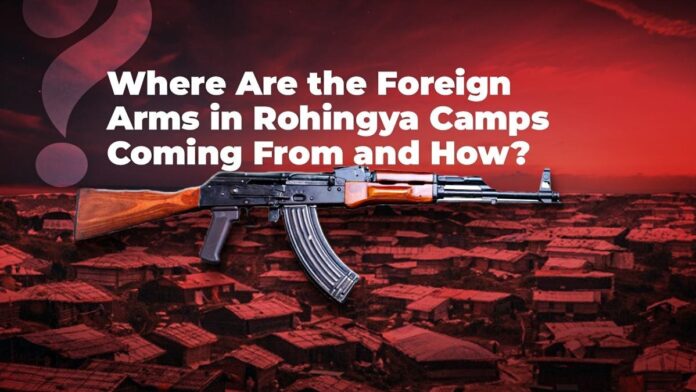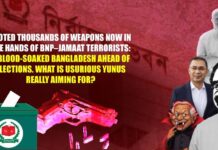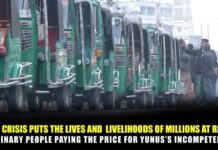A flood of weapons is entering through the Myanmar border and stockpiling in the Rohingya camps. With national elections approaching, the public is deeply concerned about the threat these arms pose. Right under the nose of the state machinery, a massive arms trafficking operation is underway. Deep in the hills of Cox’s Bazar, behind the façade of the refugee camps, a large weapons cache has taken root. Foreign rifles, pistols, SMGs, rocket launchers, grenades, ammunition – all are being stored in the depths of the hills.
These weapons aren’t staying confined to the borders. Like a spreading current, they are seeping into the country’s heart – into cities, towns, alleys, and neighborhoods.
The police, RAB, and Coast Guard are all aware of this threat. The evidence is piling up in official records. In the last two and a half years alone, over 300 cases have been filed under arms laws in Cox’s Bazar. In the first five months of this year alone, 70 cases have been recorded. These aren’t just numbers on paper – they are manifesting in streets, markets, and the growing fear of the public. RAB-15 has recovered over a thousand weapons in its operations. Joint raids by the Coast Guard and police have seized thousands of rounds of ammunition, foreign arms, and large quantities of drugs and money. These recoveries are not coincidental. They reveal how deeply entrenched and organized the arms trafficking network is.
Border shootouts and clashes with traffickers in the hills are no longer just headlines in newspapers. These incidents pose a direct challenge to national security. Traffickers are no longer merely sneaking in through backdoors – they are now confronting the state’s security forces with arms. They fire and vanish into the shadows of the hills. What does this boldness signify? Under whose protection is this grand operation being carried out? These questions linger with no easy answers.
The Rohingya camps are no longer just humanitarian crisis zones; for a portion of militant Rohingyas, they’ve turned into secure hubs for arms trade. Local administration and law enforcement sources repeatedly mention Rohingya involvement. Arms trafficking, dealing, robbery, abduction – these crimes are being born in the nearby hill caves and makeshift hideouts. Traces of the seized weapons often lead back to these areas. Those arrested get bail and return to their dark trade.
With national elections ahead, the arms smuggling has surged alarmingly. Stakeholders fear these weapons could be used for electoral violence. Who benefits from political instability? Who will wield these weapons? These questions are growing heavier by the day. On May 31, ten hand grenades and detonators were recovered in Damdamia – was it a precursor to something larger? No arrests were made. The perpetrators still roam free, plotting their next move.
A dangerous stockpile is forming from a mix of foreign and domestic arms. Heavy weapons are flowing in from Myanmar, while locally made weapons are arriving from Maheshkhali. These two streams converge in the hilly areas of Cox’s Bazar. Teknaf and Ukhiya – once mere geographic names – are now synonymous with arms trafficking. According to Coast Guard media officer Lieutenant Commander Harun-ar-Rashid, the traffickers are active, well-armed, and dangerous. Joint forces are being deployed in the field, risking their lives to combat them.
Additional Superintendent of Police Jasim Uddin Chowdhury has directly stated that arms-related crimes have increased due to the Rohingyas. The commander of the 16 Armed Police Battalion, Additional DIG Md. Kawsar Sikder, echoed this, citing terrorist Rohingyas’ involvement in arms trading and crimes. Cases are ongoing in court, accused individuals are out on bail – but outside the courtroom walls, is anything really changing? Is the mountain of arms shrinking, or is it growing further?
The shadow of these weapons doesn’t just haunt the people of Cox’s Bazar or border regions – it casts a dark cloud over the entire nation. Every smuggled rifle, grenade, and bullet is like a landmine buried beneath the surface of peace. No one knows when, where, or how it might explode. Are the country’s leaders hearing this warning? Or is it echoing only in the pages of newspapers and flickering on television screens? The time for effective, visible, and ruthless action to halt this flood of weapons is now. Tomorrow may be too late.
Source: Kaler Kantho – 8 July 2025





